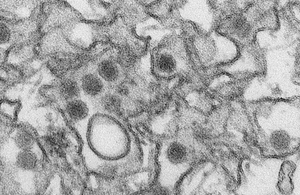Zika virus: updated travel advice for pregnant women
Pregnant women advised to postpone non-essential travel to areas with active Zika virus transmission.

Public Health England (PHE) and the National Travel Health Network and Centre (NaTHNaC) have been carefully monitoring the evolving Zika virus outbreak in South and Central America and the Caribbean and are now issuing updated travel advice for pregnant women and advice on preventing sexual transmission.
Travel and pregnancy
It is recommended that pregnant women should postpone non-essential travel to areas with active Zika transmission until after pregnancy. This is a change to the previous advice which encouraged pregnant women to consider avoiding travel and seek travel health advice.
In addition it is recommended that women should avoid becoming pregnant while travelling in an area with active Zika virus transmission, and for 28 days following return home.
If a woman develops symptoms compatible with Zika virus infection on her return to the UK, it is recommended she avoids becoming pregnant for a further 28 days following recovery.
Advice has also been updated for healthcare professionals. In the event that travel to an area with current active Zika virus transmission cannot be postponed, the pregnant traveller or those planning pregnancy should discuss with their healthcare provider the risks which Zika may present. In addition, the use of scrupulous mosquito bite avoidance measures both during daytime and night time hours (but especially during mid-morning and late afternoon to dusk, when the mosquito is most active) should be emphasised, and an information leaflet provided.
Preventing sexual transmission
A number of cases of sexual transmission of Zika virus have been reported, and in a limited number of cases, the virus has been shown to be present in semen. The risk of sexual transmission of Zika virus is thought to be very low.
Our advice:
- condom use is advised for male travellers if their partner is pregnant, during travel and for the duration of the pregnancy
- if there is a risk of pregnancy, or pregnancy is planned, condom use is advised during travel and for 28 days on return from an active Zika transmission area if the male traveller does not have any symptoms compatible with Zika virus infection. If a clinical illness compatible with Zika virus infection has been suspected or confirmed, this advice should be followed for 6 months following the start of symptoms.
- even if not pregnant or planning to be, couples who wish to reduce the very low risk of virus transmission may consider using condoms if the man has had clinical illness compatible with Zika infection
Dr Dipti Patel, director at NaTHNaC said:
All travellers, especially pregnant women going to an area where there is current active Zika virus transmission should ensure they seek travel health advice from their GP or a travel clinic well in advance of their trip and consult the NaTHNaC website for up to date information on where current active transmission is occurring and country information.
We strongly advise all travellers to avoid mosquito bites and recommend that pregnant women should postpone non-essential travel to areas where Zika virus outbreaks are ongoing until after their pregnancy. If travel is unavoidable, or they live in areas where active Zika virus transmission is reported, they should take scrupulous insect bite avoidance measures both during daytime and night time hours and also seek advice from their GP, midwife or obstetrician. Women who are planning to become pregnant should discuss their travel plans with their healthcare provider to assess the risk of infection with Zika virus and receive advice on mosquito bite avoidance measures. Tailored advice for pregnancy and travel is available at NaTHNaC’s website.
Professor Paul Cosford, Director for Health Protection & Medical Director at Public Health England, said:
As our knowledge of the Zika virus, and the evidence linking microcephaly to Zika infection, becomes clearer a more precautionary approach is warranted. This advice will be kept under review and updated as more information becomes available.
We expect to see small numbers of Zika virus infections in travellers returning to the UK, but the risk to the wider population is negligible as the mosquito vector is not found in the UK. The symptoms of can be similar to other mosquito-borne infections such as dengue, chikungunya and malaria so laboratory testing is essential for the correct diagnosis. If you have recently returned from an area where Zika virus transmissions are currently reported and have a fever or flu-like illness, seek medical attention without delay to exclude malaria and mention your travel history.
Zika virus is related to dengue virus. The virus is spread by the Aedes mosquito, which predominantly bites during the day. The illness is similar to dengue and chikungunya and is generally mild and self-limiting, lasting 2 to 7 days.
Symptoms of Zika virus infection may include fever, joint pain, rash, conjunctivitis/red eyes, headache, muscle pain and eye pain. No specific anti-viral treatment is available for Zika virus infection.
For more information about Zika virus refer to the PHE or NaTHNaC websites.